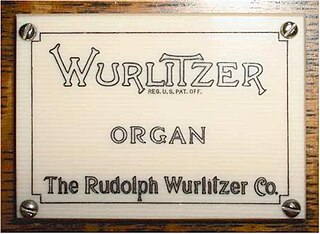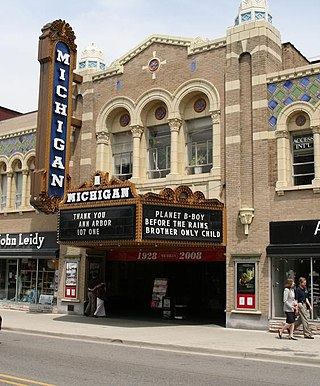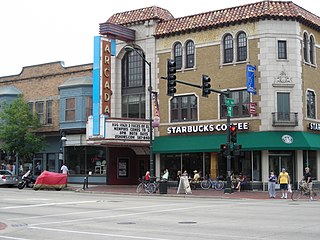Related Research Articles

A theatre organ is a type of pipe organ developed to accompany silent films, from the 1900s to the 1920s.

The Rudolph Wurlitzer Company, usually referred to as simply Wurlitzer, is an American company started in Cincinnati in 1853 by German immigrant (Franz) Rudolph Wurlitzer. The company initially imported stringed, woodwind and brass instruments from Germany for resale in the United States. Wurlitzer enjoyed initial success, largely due to defense contracts to provide musical instruments to the U.S. military. In 1880, the company began manufacturing pianos and eventually relocated to North Tonawanda, New York. It quickly expanded to make band organs, orchestrions, player pianos and pipe or theatre organs popular in theatres during the days of silent movies.
The Holtkamp Organ Company of Cleveland, Ohio is America’s oldest continuously operating pipe organ workshop. The company was founded in 1855 by Gottlieb Votteler. The work produced by the shop has evolved over the years in terms of architectural style, sound, and mechanism. During this time the company has had a number of names, including: The Votteler Organ Company, The Votteler-Hettche Organ Company, The Votteler-Holtkamp-Sparling Organ Company, and finally in 1951, The Holtkamp Organ Company.
Mathias Peter Møller, commonly known as M.P. Möller or Moeller, was a prolific pipe-organ builder and businessman. A native of the Danish island of Bornholm, he emigrated to the United States in 1872 and founded the M.P. Moller Pipe Organ Company in Greencastle, Pennsylvania, in 1875. The city of Hagerstown, Maryland, took notice of Möller's early successes and induced him to move his business there in 1881 to help make it a viable business center in Western Maryland. The company remained in business in Hagerstown. until 1992, with hundreds of employees at its peak and a lifetime production of over 12,000 instruments.

The Michigan Theater is a movie palace in Ann Arbor, Michigan, United States, near the Central Campus of the University of Michigan. It shows independent films and stage productions, and hosts musical concerts.

The Kings Theatre, formerly Loew's Kings Theatre, is a live performance venue in the Flatbush neighborhood of Brooklyn, New York City. Opened by Loew's Theatres as a movie palace in 1929 and closed in 1977, the theater sat empty for decades until a complete renovation was initiated in 2010. The theater reopened to the public on January 23, 2015 as a performing arts venue. It was listed on the National Register of Historic Places on August 22, 2012.

The Chicago Theatre, originally known as the Balaban and Katz Chicago Theatre, is a landmark theater located on North State Street in the Loop area of Chicago, Illinois. Built in 1921, the Chicago Theatre was the flagship for the Balaban and Katz (B&K) group of theaters run by A. J. Balaban, his brother Barney Balaban and partner Sam Katz. Along with the other B&K theaters, from 1925 to 1945 the Chicago Theatre was a dominant movie theater enterprise. Currently, Madison Square Garden, Inc. owns and operates the Chicago Theatre as a performing arts venue for stage plays, magic shows, comedy, speeches, sporting events and popular music concerts.

Austin Organs, Inc., is a manufacturer of pipe organs based in Hartford, Connecticut. The company is one of the oldest continuously-operating organ manufacturers in the United States. The first instruments were built in 1893 with the Austin Patent Airchest, and many remain in fine playing condition to this day.

The Boardwalk Hall Auditorium Organ is the pipe organ in the Main Auditorium of the Boardwalk Hall in Atlantic City, New Jersey, built by the Midmer-Losh Organ Company. It is the largest organ in the world, as measured by the number of pipes.

The Redford Theatre is an atmospheric theatre in the Old Redford neighborhood of Detroit. The theatre opened in January 1928, advertised as "Detroit's most unique suburban theatre," due to its grand design, featuring Japanese and Chinese motifs.

The Robert Morton Organ Company was an American producer of theater pipe organs and church organs, located in Van Nuys, California. Robert Morton was the number two volume producer of theatre organs, building approximately half as many organs as the industry leader Wurlitzer. The name Robert Morton was derived not from any person in the company, but rather from the name of company president Harold J. Werner's son, Robert Morton Werner.

The Arcada Theatre Building is a theater in St. Charles, Illinois located on Main Street. The theatre was opened on Labor Day, September 6, 1926, engaging projection of silent movies and the staging of live vaudeville acts. Except for brief periods of renovation, it has remained continuously open. It is listed on the National Register of Historic Places.

Martin Ellis is an American church, concert and theatre organist. He is currently the organist for Rose City Park Presbyterian Church in Portland, Oregon. He was Principal Organist and Assistant Music Director at North United Methodist Church, and Senior Staff Pianist/Organist, Staff Arranger and Orchestrator for the Indianapolis Children's Choir and Youth Chorale in Indianapolis, Indiana until August, 2014. He works with Gresham High School's Theatre Arts Department as their resident piano accompanist.
William Hill & Son & Norman & Beard Limited were a major pipe organ manufacturer originally based in Norfolk.
The Marr & Colton Company was a producer of theater pipe organs, located in Warsaw, New York. The firm was founded in 1915 by David Jackson Marr and John J. Colton. The company built between 500 and 600 organs for theatres, churches, auditoriums, radio stations, and homes.

The State Theatre is a Spanish-styled atmospheric theatre in Kalamazoo, Michigan, designed by renowned architect John Eberson. The State was built for W.S. Butterfield Theatres in 1927, and remains in operation today, presenting live shows. The theatre was listed on the National Register of Historic Places in 2021.

Hinners Organ Company was an American manufacturer of reed and pipe organs located in Pekin, Illinois. Established in 1879 by German-American John Hinners, the firm grew through several partners, becoming Hinners & Fink in 1881, Hinners & Albertsen in 1886, and Hinners Organ Company in 1902. In the 1920s Hinners established a subsidiary, the Illinois Organ Supply Company, which mass-produced parts for Hinners and other firms. Business declined in the 1930s due to the Great Depression, changing technology, and increasing competition. Hinners became a service company in 1936 and closed in 1942.
The Organ Grinder Restaurant was a Portland, Oregon pizzeria in operation from 1973 to 1996. At one point it housed the largest theater pipe organ of its type in the world.

The Senate Theater is a theater in Detroit, Michigan, known for its "Mighty Wurlitzer" pipe organ, originally installed at the Fisher Theater. The Senate opened in 1926, deteriorated substantially after its closure in the 1950s, and reopened in 1964 under the ownership and volunteer operation of the Detroit Theatre Organ Society. The Senate continues to present organ performances, classic films, and private events.
References
- 1 2 "Pipe Organ Database". Organ Historical Society. Archived from the original on 5 December 2014. Retrieved 10 October 2023.
- ↑ "Palace Theatre". American Theatre Organ Society. Retrieved 10 October 2023.
- ↑ "Arcada Theatre". American Theatre Organ Society. Retrieved 29 November 2014.
